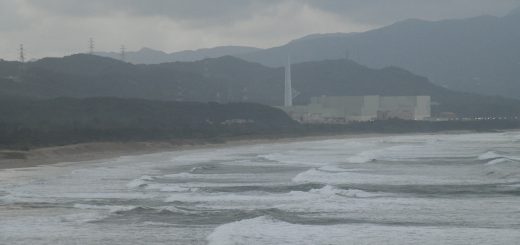Citizens Challenge APEC Energy Ministers in Fukui Nuke Info Tokyo No. 137
On June 19, the APEC (Asia-Pacific Economic Cooperation) Energy Ministers’ Meeting, held in Fukui City, Japan, issued a declaration concerning “Low Carbon Paths to Energy Security”. For the first time, the declaration included support for new nuclear power plant construction. It is reported that Japan pushed strongly for this.
The schedule for June 20 included a tour of the Monju Prototype Fast Breeder Reactor in Tsuruga City in Fukui Prefecture, but only representatives from the Malaysian and Vietnamese delegations turned up. No ministers attended. Monju, which had just restarted the previous month for the first time in 14 years, was shut down for inspections from the first day of the APEC meeting. Perhaps the government wanted to avoid problems arising while APEC delegates were present. (See article on page 2 for information about the problems that have arisen so far.)
In opposition to the APEC Energy Ministers’ Meeting, civil society held a “Citizens’ Energy Symposium” in Fukui City on the afternoon of June 19. Speakers explained why nuclear power is not useful in the prevention of climate change and how exporting Japanese nuclear reactors is equivalent to exporting pollution.
Following the keynote speech by Professor Ken’ichi Oshima of Ritsumeikan University, there was a panel discussion chaired by Meiji University Emeritus Professor Iwane Fujii. Panelists included Professor Oshima, Professor Koichi Hasegawa of Tohoku University, environmental journalist Manami Suzuki and myself.
Professor Oshima presented findings from his own research into the cost of nuclear power and CO2 emissions, along with the results of overseas research into these issues. The Japanese government and electric power companies claim that nuclear power is cheap, but this is a result of calculations based on arbitrary assumptions. Professor Oshima’s analysis, based on costs published in utilities’ financial reports, showed that nuclear power in Japan is by no means cheap. This is so despite the favorable treatment meted out to nuclear power by government policies. Moreover, back end costs, including reprocessing, are greater than the premium paid for electricity from renewable sources. Also, if the “time lag” is taken into account, CO2 emissions are higher than for renewable energy alternatives.
The “time lag” refers to the fact that photovoltaic cells and wind power can be installed rapidly, whereas it takes a long time to construct nuclear power plants. Since fossil fuel plants are used while the nuclear power plants are being constructed, these emissions should be factored into any comparison.
Hasegawa explained that Japan’s nuclear-dependent CO2 emission reduction policies have failed, because whenever nuclear power plants are shut down as a result of earthquakes and scandals, fossil fuel plants are used to make up the energy deficit. He said that more effort should be put into efficient use of energy and the promotion of renewable energy. Finally, he pointed out that there is a danger that the competition between Japan and South Korea in their promotion of nuclear power could lead to nuclear proliferation.
Suzuki warned of the risks inherent in Japan’s nuclear export policy. This policy is premised on public finance backed by taxpayers’ money and pension funds. Finally, I outlined why nuclear power cannot contribute to solving climate change. In fact, electric power companies would prefer not to emphasize climate change. They are wary that energy conservation will lead to a shrinking economy and that a shift to renewable energy will obstruct increased use of coal.
As well as promoting nuclear power, the APEC Energy Ministers’ Meeting declaration stated, “Fossil fuels will continue to play a key role in the APEC energy market as economies develop new and unconventional energy sources.” The citizens’ symposium not only expressed its opposition to nuclear energy, it also appealed for energy conservation and active take up of renewable energy, aimed at a phase out of both nuclear energy and fossil fuels.
Baku Nishio (CNIC Co-Director)
A statement was sent to the APEC Energy Ministers’ Meeting by the No Nukes Asia Forum. The full statement, which was endorsed by 25 NGOs from 11 countries, can be found on the following web site:
www18.ocn.ne.jp/~nnaf/apec2010.htm

